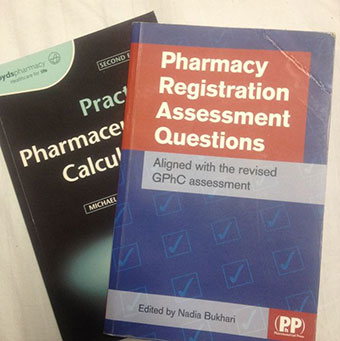February 14, 2017, by Editor
My Pre-reg Adventures: Exam Preparation
This blog has been written by James Smith, one of our MPharm graduates.
For those who have not read my previous pre-reg blogs (which can be found here and here), I recently completed my pharmacy pre-registration training year and have documented my experiences for upcoming aspiring pharmacists soon to go through the same process. For those who do not know, the pre-reg year is effectively a year of on-the-job training that a pharmacy graduate must undertake in order to become a qualified pharmacist. I undertook a split pre-reg year, spending 6 months in hospital and 6 months in industry. Ultimately, pre-regs can work in a community pharmacy, a hospital pharmacy or they can spend 6 months working for a pharma company and 6 months in a hospital.
In the last 2 months of pre-reg, I started to look towards the final hurdle between myself and qualification; the dreaded pre-reg examination. For most, this exam seems like life or death. Many of my friends had jobs lined up that were all but confirmed bar one condition: them passing the exam. It is an exam that can ultimately make or break a career – fail it 3 times and becoming a pharmacist will be reduced to a pipedream – just like Leicester City winning the premier league (oh… my bad). My situation was slightly different to most as I had a PhD sorted and I knew it was my part-time job that depended upon the result of the exam. Naturally, this meant I may have felt slightly less pressure than some of my peers. That being said, I was still nervous on the day and had no intention of failing, so I worked hard to ensure that I passed!
The exam is split into two papers. One is sat in the morning, the other in the afternoon. Our morning paper was purely calculations. 40 calculations in 2 hours, averaging 3 minutes a question. The afternoon paper was a clinical and professional skills paper. Both papers were multiple choice. However, that isn’t as easy as it sounds. Of the possible answers, there tend to be a couple that are completely wrong, but then 2 or 3 that are similar/plausible, making you think or doubt your own mind.
I started my revision around 2 months prior to the exam,
initially with short sessions every other day, before slowly cranking up the workload to a couple of hours daily. I also took two weeks of annual leave before the exam to revise ‘full time’. Incidentally, 2 weeks was excessive and I grew incredibly bored during that period, struggling to stay focused on revision. Thankfully, this boredom was helped by the fact that I was ‘pug-sitting’ the world’s naughtiest pug at the same time. Whenever I needed a break I had a play buddy to keep me entertained (and to tire me out). I also made a revision timetable to map out what topics I needed to cover and to make sure I missed no key areas out. I based this on the information provided by the GPhC regarding how much each topic/area makes up the exam, spending more time on high priority sections.
My top tip for revising for the pre-reg exam: do as many practice questions as you can. By doing this, you can ensure that you cover all the exam topics, improve your knowledge and learn what the GPhC expect you to know. A lot of people dislike tackling practice questions early on into revision due to ‘not wanting to get things wrong/feel like an idiot’. I appreciate that everyone has their different learning styles and that what works for one person will not work for another. But this exam is different to previous university exams in that you have had a year of training and working in the relevant sectors, potentially with intermittent study days and cross sector placements, meaning that much of the core knowledge required is already stored subconsciously in people’s heads – it’s now just about bringing it to the forefront to allow safe passage through the exam!
My philosophy is: it is better to make those mistakes in mock questions rather than the actual exam. I personally learn best by making mistakes; if I make a big mistake, I learn and remember not to do it again! Interestingly, feedback from my peers suggests that the majority of people I know learnt the same way. Personally, I find repeatedly reading or writing out notes is like wallpapering with a Pritstick – it takes time and is a painful process with pieces failing to stick until the Pritstick has been applied numerous time (and looks mangy and deformed by the end). For me, getting a mock question wrong is like super strong industrial glue. My pride cannot take getting that question wrong again and the correct answer sticks in my head for the short period of time. Providing the next time that I come across the topic isn’t too distant, I tend to be able to avoid the same mistakes and apply the logic I learnt previously to get the correct answer. Also, by getting questions wrong you are able to identify your weaknesses and address them before it is too late! Many people fear getting things wrong, but I feel they should be embraced (providing measures are taken to not make that mistake again)!
Signing up to ONtrack was my saving grace. This is an online resource, provided by the Royal Pharmaceutical Society, which offers hundreds of questions in the GPhC exam format. It covers all the therapeutic and professional areas required, including key questions that have repeatedly come up through the years. I also used the pre-registration assessment questions book by Nadia Bukhari, which again contains numerous questions covering all the examinable areas. These questions are written by numerous pharmacists in a variety of sectors and with a deepened understanding of what the GPhC are testing you on. This makes it a valuable resource. Finally, there are numerous mock exam events available for pre-regs to attend. My regional study group at University of Manchester organised a mock for us and it was a great help to see where I was in my knowledge (and a major kick up the backside). I personally never signed up to one of the RPS mock days, but having spoken to peers, many said that they found them quite useful later in the year as the exam loomed ever closer. Additionally, some universities offer revision days/mock exams to their alumni. Keep an eye out for these! I found the Nottingham event very useful, as well as a good opportunity to have a merry old catch up with peers and staff alike.
Another similar tip I feel suitable to make is: do not neglect calculations, even if you think that you’re a mathematical genius. Personally, I have been mathematically inclined throughout my education (nowhere near genius, mind you). Calculations are something that I actually enjoy in a very, very sick and twisted way. That moment when your army* of brain cells triumph in the bloody battle of situational algebra – victory never tastes sweeter. Thus, I pushed calculations back a little bit and focused on fortifying my weaker knowledge base of pharmacy law and services. 2 weeks before the exam, I completed a calculation mock and failed by a couple of marks, primarily due to foolish errors and running out of time. The mock was a particularly nasty paper with many longer, wordy questions than I had previously encountered; but that was no excuse! I realised at that point that my pharmaceutical calculations weren’t as strong when under the pressure of time constraints as I had assumed. Hence, I set aside a bit more time to practice over the next 2 weeks. It struck me that if I had waited until a few days before the exam to test myself, I could have left myself with a very last-minute panic to improve my methods and speed up my penmanship.
*Incidentally, my brain cells are more of a small and rebellious guerrilla militia with an erratic-combat style and the ability to superficially dematerialise into the thinnest of air (usually when I need them most).
A few friends who hated maths with a passion have passed on tips for those who do struggle: “If you’re not a mathematician, do not fear. Practice, practice, practice. Completing as many mock questions, whether from past papers, books or online resources will help you drastically!” Starting calculations earlier and in frequent short bursts will help those who’s worst nightmares consist of a never-ending maze of long division and concentration conversions. 10-15 weeks spending an hour a week on calculations may be enough for many to get to grips with them and make it a less painful process than spending the 2 days prior to the exam desperately looking up fool-proof methods to answer certain question types!
My final exam-prep tip is to familiarise yourself with drug SPCs (Summary of Product Characterisitics)/the BNF (British National Formulary). In the exam, some questions have resources attached to them, requiring you to efficiently find information. These questions are guaranteed marks if you know how to use the resources properly. Knowing where information on interactions, pharmacokinetic, pharmacodynamic, dosage, special requirements in specific patient groups etc can be found in a variety of SPCs will help. As someone who now works part-time for the BNF (which involves reading many SPCs), I can tell you that despite a common layout for SPCs, manufacturers sometimes put information in places you wouldn’t expect. For example, some drug interactions may be listed as a contraindication/caution, with no mention of them in the actual interactions section of the SPC. Having a deepened knowledge and understanding of where specific information in an SPC may well help you to speedily answer resource questions. You can access SPCs for British medicinal products on the EMC  (electronic medicines compendium) here.
(electronic medicines compendium) here.
Remember, you are learning the material that will be covered by the pre-reg exam throughout the year on the job – you probably know more than you think! The exam isn’t created to catch you out; it is to assess whether you have the knowledge to be a day-one pharmacist. Do not waste time spending hours learning the treatment regimens for multiple myeloma – it is incredibly unlikely to come up as it is a specialist area and no day-one pharmacist would be expected to know this. Use the GPhC guidance on the make-up for the exam and use that to base how much time you dedicate to each therapeutic/professional skills/legal area. There will of course be the odd question thrown in there that may be slightly above day one pharmacist level, but not many at all – and even with these questions you have a good opportunity to guess the answer via eeny-meeny-miny-mo.
Thank you for taking the time to read my latest blog instalment. For any questions regarding any of my pre-reg or other experiences, please email james.philip.smith@hotmail.co.uk or message via LinkedIn or twitter – comments below may not be seen by myself!




Hello,
My pre-reg exam is still a while away but i wanted to ask regarding the (Summary of Product Characterisitics)/the BNF (British National Formulary) section of the exam. You mentioned that some questions have resources attached to them, does this mean the resource books are usually provided during the exam?
Thank you.
Hi Joyin, sorry for late reply – I don’t get notifications when comments are posted here. You won’t get the BNF in the exam with you, but you will have an A4 booklet given to you in the exam that will contain the SPCs and BNF pages you require to answer the question. It even tells you in the exam paper which page of your resource booklet the resource you require is on!
Cheers
Nice post! Thanks for sharing amazing content.
Hey James,
Thanks a lot for the useful post!
I was wondering if you recommend a certain calculations resource to practice?